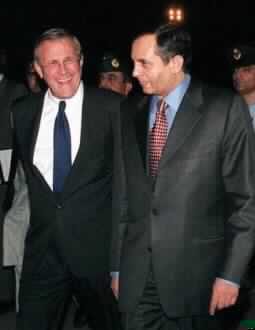HIGHLIGHTS: Claim Made By Rumsfeld During Talks with Indian Leaders||Rumsfeld Lacks Knowledge of Realities on the Ground in Kashmir, Says Pakistan||India-Pakistan Border Situation Remains Tense Despite India's Conciliatory Gestures|| STORY: Pakistan has denied suggestions by US Defence Secretary Donald Rumsfeld that terrorists from Osama bin Laden's al-Qaeda network are operating in Kashmir. (Read photo caption)
Mr. Rumsfeld's remarks came during talks with government leaders in India, before he left for discussions in Pakistan on Thursday.
The defence secretary will meet Pakistani President Pervez Musharraf and other officials, as part of international efforts to calm tensions between India and Pakistan, which have threatened to lead to war.
Mr. Rumsfeld said the situation remained tense despite a series of conciliatory gestures by India towards Pakistan.
Pakistan gave a cool response to the moves, saying India must do more if relations between the two countries are to improve.
RUMSFELD LACKS KNOWLEDGE OF REALITIES ON THE GROUND IN KASHMIR
The talks in Pakistan will focus on the crisis over Kashmir and the continuing hunt for al-Qaeda suspects.
On Wednesday, Mr. Rumsfeld thanked Pakistan for its efforts in apprehending al-Qaeda fighters who had fled across the border from Afghanistan.
But, he warned, there were indications that al-Qaeda fighters were at large near the Line of Control that divides Pakistani- and Indian-administered Kashmir.
Previously, US officials have said there was no evidence al-Qaeda members were in Kashmir, although India has insisted they were operating there.
A Pakistani military spokesman said Mr. Rumsfeld's comments suggested a lack of knowledge of the realities on the ground in Kashmir, where the army has been trying to prevent militants from crossing into Indian-administered territory.
INDIAN MEASURES INADEQUATE
Before leaving for Pakistan, the defence secretary credited India with trying to defuse the situation.
India has lifted a six-month long ban on Pakistani over flights, appointed a new high commissioner to Pakistan and is withdrawing its navy from near Pakistani waters.
But Pakistan signalled the measures were inadequate.
"In a situation where the Indian forces are massed on Pakistan's borders in a dangerous posture of confrontation, the Indian decisions do not address the main causes of tension," the Pakistani Foreign Ministry said.
Speaking on a tour of the Middle East, President Musharraf called for "more substantive action" from India.
NO FIRM DECISION ON MONITORING PLANS
In Delhi, Mr. Rumsfeld said he and Indian Prime Minister Atal Behari Vajpayee discussed the participation of international troops in Kashmir, and the possible use of American surveillance technology to monitor militant incursions across the line.
But he added that no firm decision had been reached.
PHOTO CAPTION
Abdul Razak Dawood, right, Pakistan's Commerce and Industries minister receives Donald H. Rumsfeld, U. S. Secretary of Defence at Pakistan Air force Base in Islamabad, Pakistan on Wednesday, June 12, 2002. Rumsfeld arrived here from India to hold talks with Pakistani officials regarding tension between Pakistan and India. (AP Photo/Press Information Department/ho
- Author:
& News Agencies - Section:
WORLD HEADLINES


 Home
Home Discover Islam
Discover Islam Quran Recitations
Quran Recitations Lectures
Lectures
 Fatwa
Fatwa Articles
Articles Fiqh
Fiqh E-Books
E-Books Boys & Girls
Boys & Girls  Ramadan
Ramadan Fatwa Audios
Fatwa Audios Month of Mercy
Month of Mercy Women
Women Eed Al- Fitr
Eed Al- Fitr Food Recipes
Food Recipes Videos
Videos

 Prayer Times
Prayer Times












